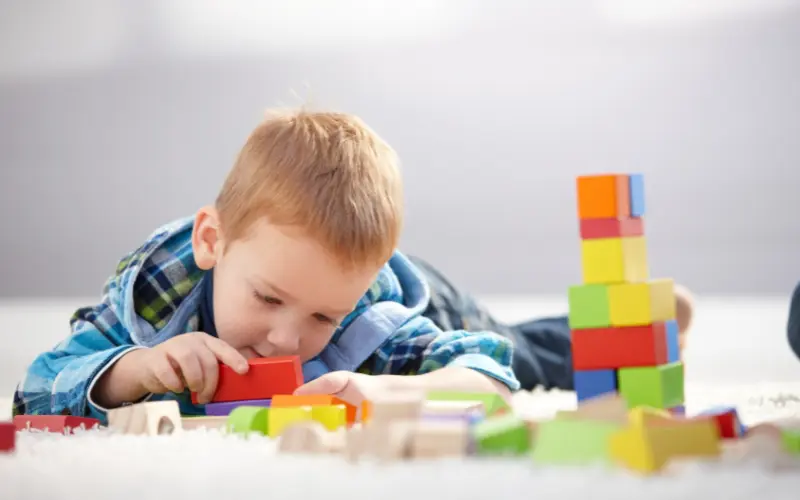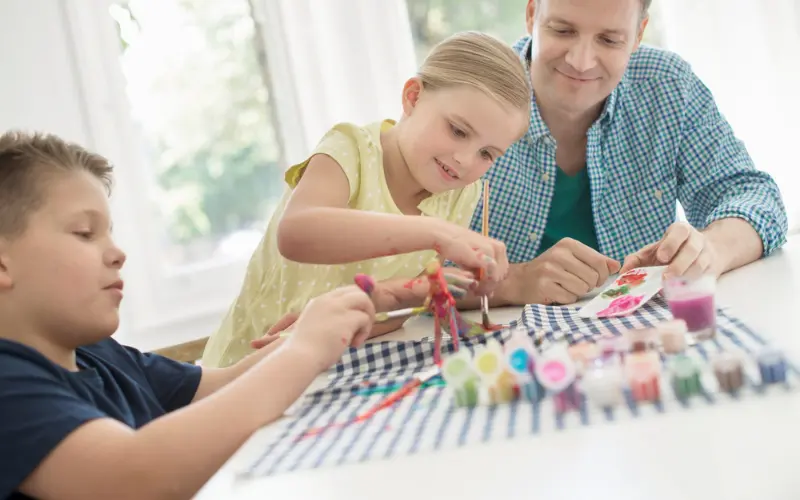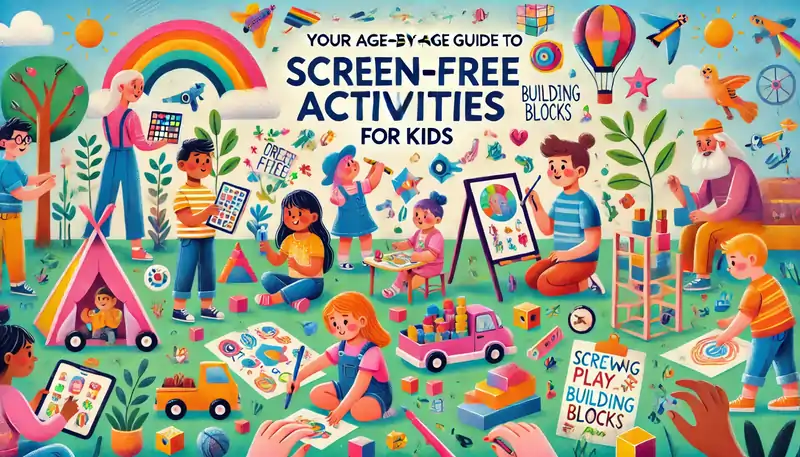Table of Contents
Screen-Free Activities For Kids
In today’s digital age, keeping kids entertained and stimulated without resorting to screens is becoming a growing concern for parents. However, it’s essential to incorporate meaningful screen-free activities to wean kids off their screens, especially as more research points to the negative impacts of excessive screen time on developing minds. This age-by-age guide will help you discover screen-free entertainment ideas tailored to different stages of childhood, providing parents with a range of engaging activities to do with their children at home. Whether you’re looking for hands-on learning or outdoor play, these suggestions will encourage healthy habits while making family time fun.
Encouraging children to engage in screen-free activities is essential for their overall development. A great resource for parents looking for fun, engaging activities is the University of Maryland’s guide on screen-free fun, which provides a variety of creative and educational activities designed to keep kids entertained while promoting their physical and mental well-being.
As you engage in screen-free activities with your little ones, it’s important to remember the impact of sleep deprivation on both parents and children. Sleep-deprived parents may find it challenging to keep up with the energy levels of their kids. For tips on managing this common issue, check out our article on How to Deal With Sleep Deprivation After Baby, where you’ll find effective strategies to regain your energy and improve your overall well-being.
Screen-Free Activities for Babies (0-1 Year)

Babies are in a phase of rapid growth and discovery, and they need activities that allow them to explore their senses while fostering their cognitive and motor development. The good news is that infants can engage in a wide variety of screen-free activities to wean kids off their screens even before screens become a daily habit.
Sensory Exploration:
- Sensory Play Mats: These mats are designed with bright colors, different textures, and attached toys that stimulate your baby’s senses and encourage tummy time.
- Rattles and Soft Toys: Soft toys and rattles are perfect for little hands and help improve grasping skills, which are vital at this age. You can also introduce teethers that offer sensory stimulation while soothing aching gums.
- Mirror Play: Babies love looking at reflections. Place an unbreakable mirror near their play area to promote self-awareness and cognitive skills.
Visual and Auditory Stimulation:
- Nursery Mobiles: A hanging mobile above their crib keeps them visually engaged. Choose mobiles with contrasting colors to aid their visual development. (Link to product from your store)
- Lullabies and Nursery Rhymes: Even at this early stage, music plays an important role in your baby’s growth. Sing simple lullabies or play soft music to soothe them, while helping them become familiar with different sounds and rhythms.
When planning screen-free activities for kids, it’s essential to be prepared for the unexpected, especially during playtime or outings. Understanding how to manage diaper blowouts and leaks can help ensure that both children and parents have a stress-free experience. For tips on effectively handling diaper mishaps, including practical solutions and essential products, check out our detailed guide on Managing Diaper Blowouts and Leaks. This resource provides valuable insights that can make diaper changes smoother, allowing your family to focus on enjoying quality time together without interruptions.
Toddler Screen-Free Fun (1-3 Years)

Toddlers are active explorers, and they are constantly on the move, eager to learn more about the world around them. Their boundless energy can sometimes make screen time seem like the easiest way to settle them down, but there are plenty of screen-free entertainment ideas to keep them engaged.
Building Motor Skills:
- Stacking Toys and Blocks: Building towers with blocks improves fine motor skills and hand-eye coordination. Try colorful stackable toys that encourage problem-solving.
- Push and Pull Toys: These toys help toddlers work on their balance while giving them a sense of independence. Pull-along animal toys or wagons can keep them moving and giggling.
- Outdoor Exploration: Simple games like kicking a ball or exploring a small garden can keep toddlers active while also exposing them to the outside world. Outdoor activities like nature walks or playing in a sandbox encourage physical development and curiosity.
Pretend Play:
- Pretend Cooking Sets: Give your toddler a set of pretend kitchen toys. They’ll love mimicking grown-up activities like “cooking” and serving imaginary meals.
- Dress-Up: Costumes and accessories like hats or scarves transform your toddler into a superhero, animal, or favorite character. Imaginative play nurtures creativity and helps them process the world around them.
As you explore engaging screen-free activities for your little ones, it’s also essential to pay attention to their health and well-being. For instance, if you have a newborn, you might want to learn about jaundice, a common condition that affects many infants. Understanding the Jaundice in Newborns – Symptoms, Causes, and Treatment can help you recognize when to seek medical advice. Incorporating health knowledge into your parenting can ensure a holistic approach to your child’s development, alongside fun and interactive play.
Preschool Play (3-5 Years)

As preschoolers gain more independence, it’s important to offer them a variety of screen-free things to do with kids at home. Activities at this age should challenge their creativity and social skills while allowing them to express themselves.
Crafting and Creativity:
- Arts and Crafts Kits: Invest in kits that include coloring books, stickers, crayons, and safety scissors to foster artistic expression. These hands-on projects will keep preschoolers busy for hours.
- Clay Modeling: Let them create animals, flowers, or whatever comes to mind with modeling clay. It’s an excellent way to improve dexterity while encouraging creativity.
- DIY Projects: Try simple home-based projects, like creating paper plate masks or DIY crowns, to stimulate imagination and hands-on learning.
Engaging Outdoor Play:
- Gardening Together: Teach them about plants by letting them water flowers or plant seeds in the garden. This not only introduces them to the wonders of nature but also helps develop responsibility.
- Obstacle Courses: Create a mini obstacle course with items around the house, like cushions, boxes, and chairs. This keeps your preschooler physically active while encouraging problem-solving.
Screen-Free Things To Do With Kids At Home (6-8 Years)

As kids enter school age, they develop stronger social, problem-solving, and cognitive abilities. This is a great age to introduce them to more complex activities that keep them entertained without relying on screens.
Interactive Learning:
- DIY Science Experiments: Conduct simple experiments using household items, like making a baking soda volcano or growing crystals. These activities combine fun and learning.
- Board Games: Introduce age-appropriate board games that involve strategy and teamwork. Games like Connect Four or Guess Who are great for building logic and communication skills.
- Cooking Together: Invite your kids into the kitchen to help with baking or preparing simple meals. Not only does this teach them valuable life skills, but it also gives them a sense of achievement.
Traveling with a baby can be a rewarding experience, but it requires careful planning and the right gear to ensure a smooth journey. From choosing the right stroller to selecting essential items like portable cribs and diaper bags, understanding what you need can make all the difference. For a comprehensive guide on navigating travel with your little one, including tips on must-have gear and practical advice, check out our article on How to travel with a baby, and the gear you need.
Screen-Free Entertainment Ideas (8-12 Years)

Preteens need activities that challenge their growing sense of independence while keeping them engaged in meaningful ways.
Physical Challenges:
- Sports and Outdoor Games: Preteens enjoy engaging in sports like soccer, cycling, or even joining a local team. Encourage them to participate in outdoor activities to stay physically active and develop teamwork.
- Adventure Days: Plan weekend adventures like hiking, camping, or even geocaching, where they can explore the outdoors while solving puzzles.
- Skating or Scootering: Activities like rollerblading or scootering offer excitement and exercise, and they can be done with friends or family.
Creative Independence:
- Creative Writing or Journaling: Encourage preteens to write short stories or keep a personal journal. Writing helps them process emotions and sharpen their creative thinking.
- DIY Crafts or Knitting: Projects like knitting, crocheting, or making friendship bracelets offer a sense of accomplishment and improve fine motor skills.
Screen-Free Activities to Wean Kids Off Their Screens
For teenagers, reducing screen time can be difficult, but finding fulfilling hobbies and screen-free entertainment ideas is key. Activities like learning new instruments, joining clubs, or volunteering can greatly enrich their personal development. Encourage daily routines that include dedicated periods of screen-free time. Products like books, outdoor gear, and creative supplies can help teenagers stay engaged in real-world activities. By promoting screen-free things to do with kids at home, you’ll be fostering lifelong interests that extend beyond screens.
Conclusion
Encouraging screen-free activities to wean kids off their screens not only helps in managing screen time but also promotes essential physical, emotional, and cognitive development in children. From babies to teenagers, there is a wide range of engaging, age-appropriate screen-free entertainment ideas that parents can explore. With a little creativity and some exciting tools, you can make screen-free time a regular part of your family’s daily routine. Visit our store for a selection of products designed to support your child’s development in a fun and interactive way!

